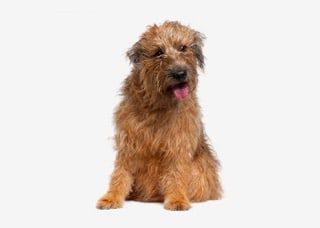
The Glen of Imaal Terrier is a medium size terrier breed originating from the County Wicklow in Ireland and was created in the 15th century. Originally used to rid Irish farms of vermin, they are also commonly used as agile hunting dogs due to their tenacity and athleticism.
The breed stands between 13-14 inches and is regarded as a resilient, sturdy and brave dog. Other distinctive features include a large head, well-defined muzzle, broad skull and a curly tail that tightens when alert. The coat is dense and rough with soft-textured, wiry and shaggy outercoat. Coloring typically seen are blue, wheaten, red and brindle.
Glen of Imaal Terrier is an energetic, active breed that requires a balanced diet to meet their nutritional needs. Responsible ownership and adoption requires understanding a breed’s dietary requirements in order to provide them with the best possible diet. Way Canina can provide safe, nutritious options to ensure a happy, healthy pet. With the right nutrition and exercise, this dog breed will thrive!
The exact creation of the breed is unknown, however, other breeds believed to have influenced the creation of the Glen of Imaal Terrier are the Irish Terrier, Lurcher, Soft-coated Wheaten Terrier and Fox Terrier.
Glen of Imaal Terriers typically have a lifespan of 12 to 15 years. Several factors can influence their longevity, such as genetics, diet, exercise, and regular veterinary care. Regular veterinary check-ups, vaccinations, and preventive care are important for ensuring that your Glen is healthy. Also, a balanced diet, portion control, and regular exercise is important to prevent obesity and maintain good quality of life. Grooming needs should be addressed regularly as well, including brushing, bathing, and ear cleaning. In terms of potential health issues or genetic predispositions, your veterinarian or breeder should be able to provide more information.
What makes them special and different from other breeds is their unwavering ferocity and dedication to their family. They make loyal, intelligent and devoted companions, providing endless love and affection. They are also known to be quite independent, with a stubborn streak that which requires thoughtful training and plenty of patience.
The Glen of Imaal Terrier is an incredibly friendly and affectionate dog breed, making them a wonderful companion for family households. They are quite intelligent and love to learn new tricks, which can make them a fun pet to have. They get along well with people of all ages, especially children, and can also get along with other household pets. It is important to start early training and socialization for this breed so that they grow to be well-mannered and behaved.
Glen of Imaal Terriers have moderate energy levels and require approximately one hour of exercise a day, which can include daily walks, runs, and playtime. They can be kept indoors and have generally quiet personalities, but they need mental stimulation in order to stay content and energized. They form strong bonds with their owners, and with the right amount of love and devotion, make wonderful lifelong companions.
The Glen of Imaal Terrier is a robust and active breed that requires a balanced diet to meet their nutritional needs and sustain energy levels. As with all breeds, responsible dog ownership should involve appropriate diet and exercise. A healthy diet should consist of animal protein, carbohydrates, healthy fats, and all the necessary vitamins and minerals. Feeding guidelines for the Glen of Imaal Terrier should take into account their activity level, size, and age, among other factors. It is important to ensure that their daily caloric needs are met and to avoid overfeeding.
To learn more about dietary needs for this dog breed, check out Way Canina. They can help owners understand which foods are okay for their pet and which to avoid. Understanding a breed’s nutritional needs is essential to being a responsible pet owner.
Regular veterinary check-ups, vaccinations, and preventive care are important for ensuring that your Glen is healthy. Also, a balanced diet, portion control, and regular exercise is important to prevent obesity and maintain good quality of life. Grooming needs should be addressed regularly as well, including brushing, bathing, and ear cleaning. In terms of potential health issues or genetic predispositions, your veterinarian or breeder should be able to provide more information.
Glen of Imaal Terriers typically have a lifespan of 12 to 15 years. Several factors can influence their longevity, such as genetics, diet, exercise, and regular veterinary care. The Glen of Imaal Terrier is an energetic, active breed that requires a balanced diet to meet their nutritional needs. Responsible ownership and adoption requires understanding a breed’s dietary requirements in order to provide them with the best possible diet. Way Canina can provide safe, nutritious options to ensure a happy, healthy pet. With the right nutrition and exercise, this dog breed will thrive!
Are you an owner of a Glen of Imaal Terrier or considering adding one to your family? Before you decide, consider the pros and cons of this breed and the responsibilities that come with ownership. Check out the Way Canina Blog for more information and comparisons of different breeds to help you decide if it’s the right fit for you. Our blog posts and articles provide great insights into a dog’s lifestyle and wellbeing – check them out today!